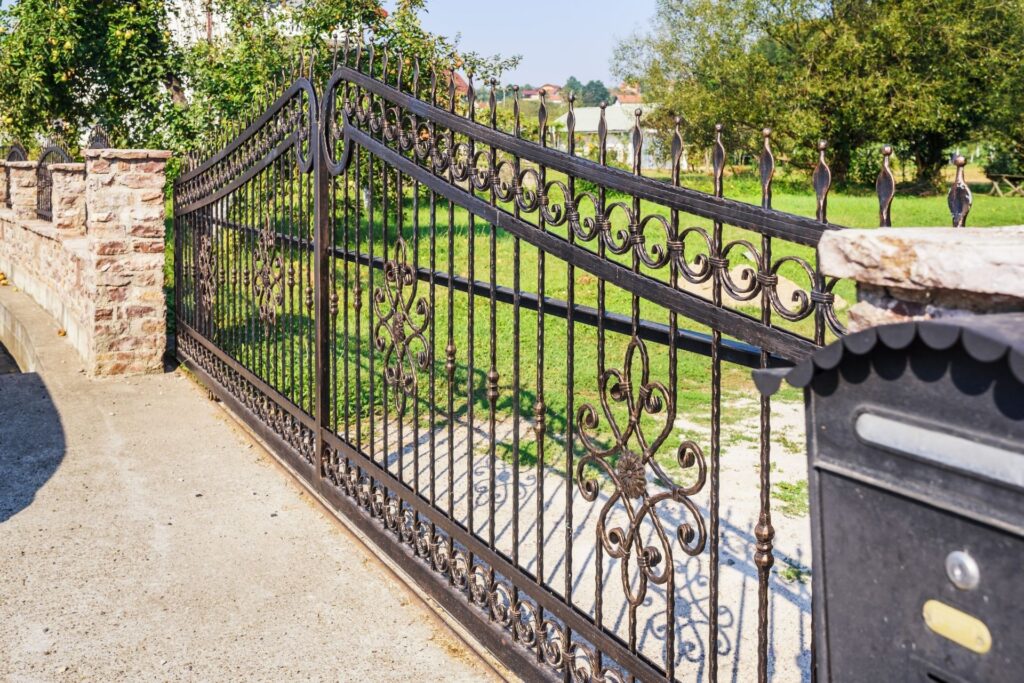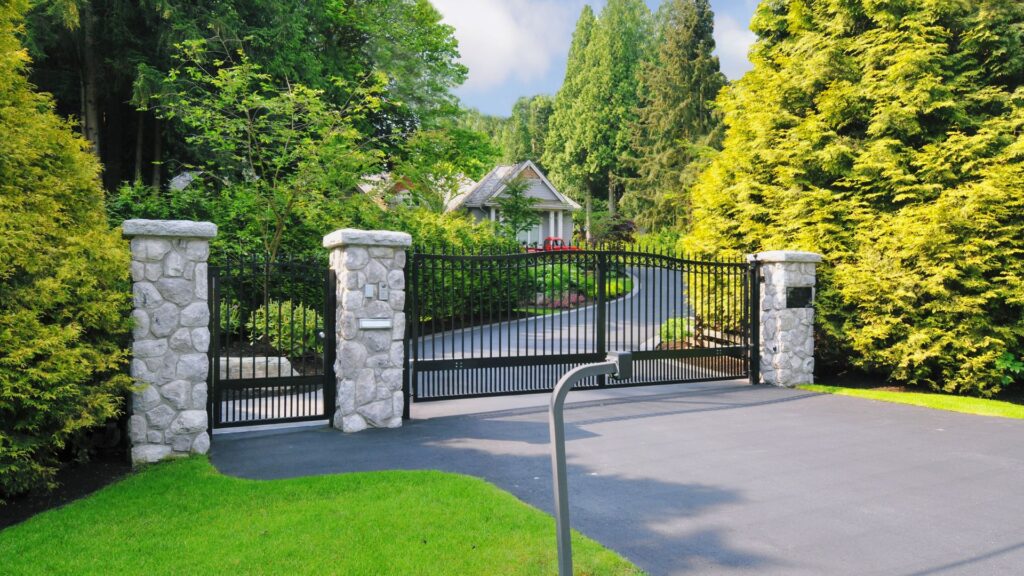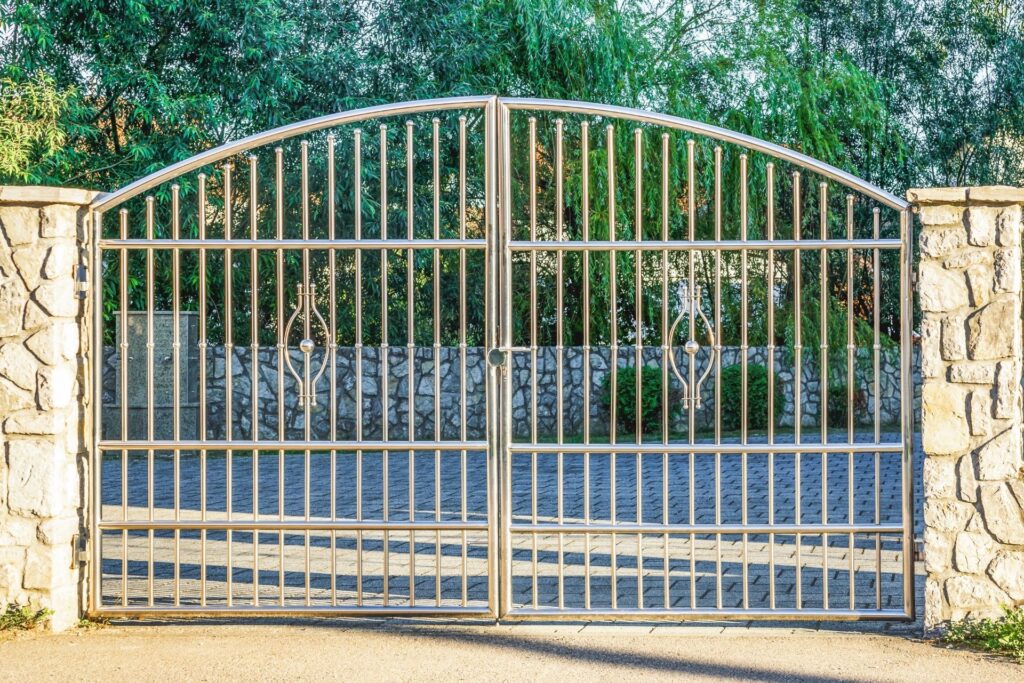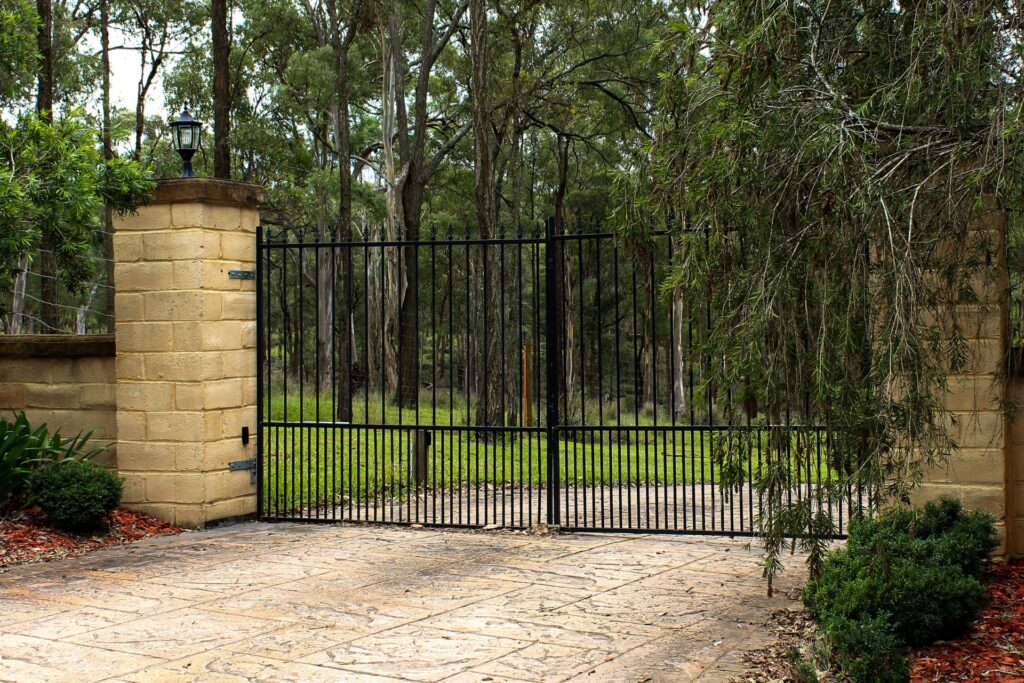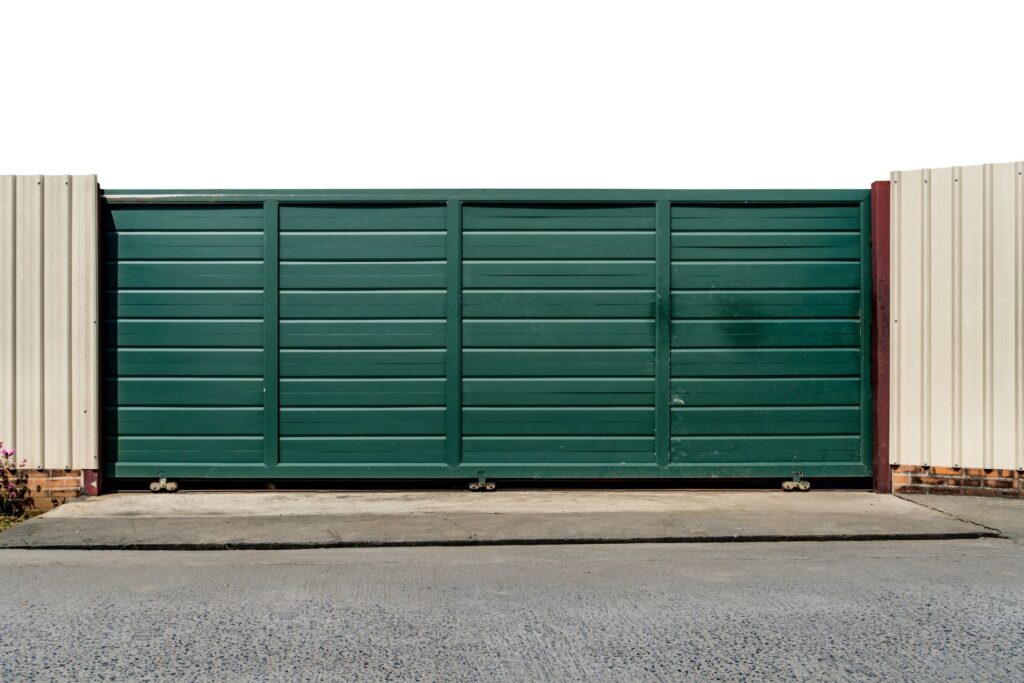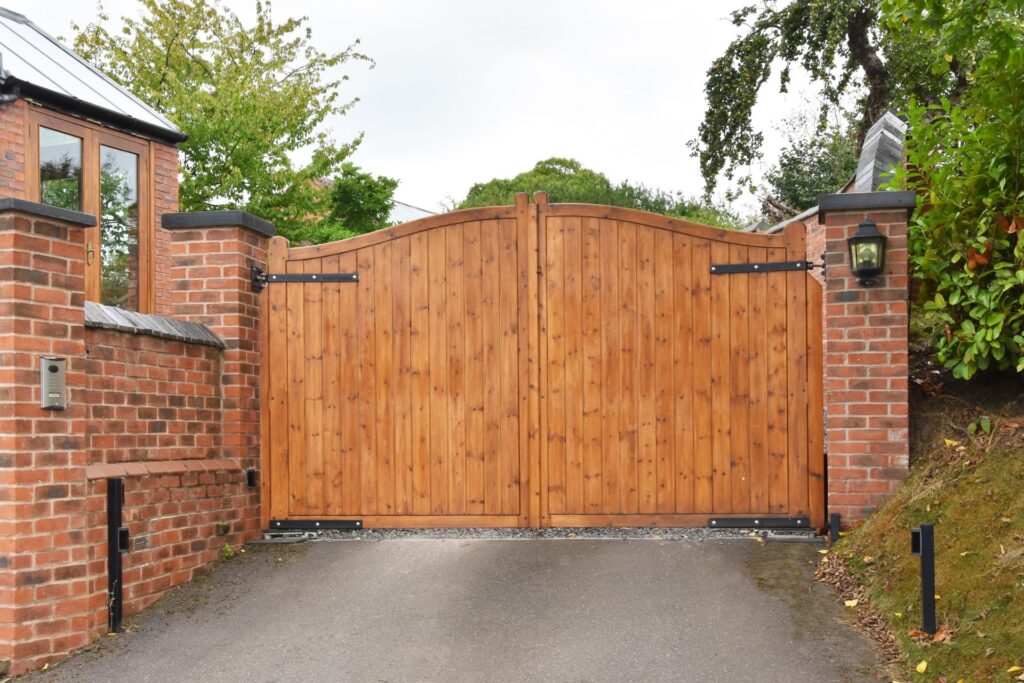Welcome to the ultimate guide on driveway gates in New Zealand! Whether you’re looking to enhance your home’s security, boost privacy, or add a touch of elegance to your property, driveway gates are a perfect choice. In this blog, we’ll walk you through the various benefits of installing a gate, explore the popular types and materials available in NZ, and offer practical advice on selecting the right style for your home. With increasing options for both manual and automatic gates, we’ll help you navigate through costs, maintenance tips, and the latest trends, ensuring you make an informed decision that suits your needs and budget.
Driveway gates in NZ offer enhanced security, privacy, and curb appeal to your home. Popular options include swing gates, sliding gates, and automated gates, available in materials like wood, metal, and composite. Installation costs vary depending on the type, material, and customization, with prices typically ranging from $1,500 to $10,000. Choose a gate that complements your property’s style while providing long-term durability against NZ’s climate.
Table of Contents
Benefits Of Installing Driveway Gates In NZ
Enhanced Security
One of the most significant benefits of installing driveway gates in New Zealand is the added layer of security they provide. A gate acts as a physical barrier, making it more difficult for potential intruders or unwanted visitors to access your property. This not only helps protect your home and belongings but also gives peace of mind knowing that your family is safer. With many options available, including those with advanced security features such as intercom systems and cameras, driveway gates can greatly enhance your home’s overall security posture.
Improved Privacy
In busy neighborhoods or homes situated close to the road, privacy can be hard to maintain. Driveway gates serve as a useful way to create a secluded space that keeps prying eyes at bay. By blocking the view of your driveway and yard, these gates help foster a more intimate and private environment, shielding your personal space from passersby. This sense of privacy can be particularly appreciated during family gatherings or quiet weekends at home.
Increased Property Value
Investing in a driveway gate can be a wise financial decision as it has the potential to increase your property’s resale value. Gates add an element of luxury and curb appeal, which can make your home more attractive to future buyers. In New Zealand’s competitive real estate market, any added features that offer both functionality and aesthetic appeal can provide a return on investment when it comes time to sell your property.
Convenience
Modern driveway gates now come equipped with automation options that make daily life more convenient for homeowners. With the push of a button or through a smartphone app, you can easily open and close your gates without leaving your vehicle. This is particularly useful during bad weather, offering effortless access to your home while maintaining security.
Aesthetic Appeal
Driveway gates aren’t just functional; they can also enhance the aesthetic of your property. Available in a variety of materials, styles, and designs, gates can be customized to complement the architecture of your home. Whether you prefer the classic look of wrought iron or a more contemporary design in timber or aluminum, driveway gates can serve as a stylish addition that enhances the overall look of your property.
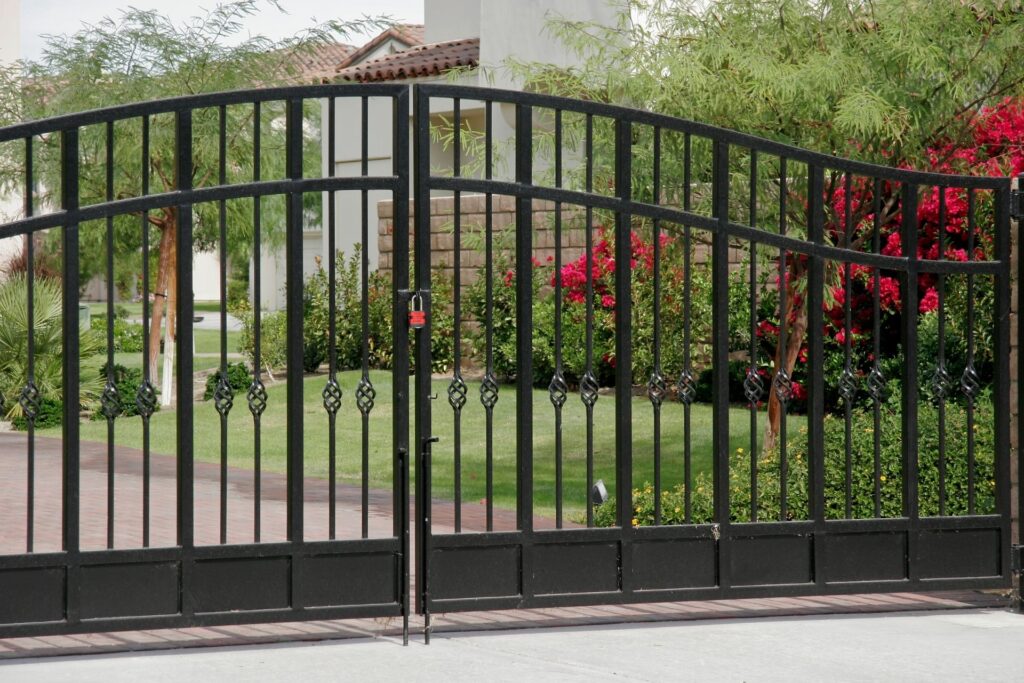
Types Of Driveway Gates Available In NZ
When selecting driveway gates in New Zealand, homeowners have several options to suit the style and practicality of their property. Let’s explore the different types of gates and their benefits.
Swing Gates
Swing gates are a classic choice for traditional and rural properties. These gates open inward or outward in a wide arc, similar to how doors work. Typically, they are installed on flat driveways with ample space on either side to accommodate the swinging motion. Swing gates add a timeless aesthetic to the entrance, making them a perfect fit for homes with a bit of land or larger front areas. However, they may not be ideal for properties with limited driveway space or uneven terrain.
Sliding Gates
Sliding gates are a practical solution for properties where space is at a premium or where the land is sloped. Unlike swing gates, which require space to open, sliding gates glide horizontally along a track, making them perfect for tighter spaces or driveways on an incline. Additionally, sliding gates are often more secure since they are harder to force open compared to their swinging counterparts. This makes them a favored option for urban homes or properties with steep gradients.
Automatic vs. Manual Gates
The choice between automatic and manual gates often comes down to budget and convenience. Automatic gates offer the ultimate in convenience, allowing homeowners to control access remotely without leaving their vehicle. They are ideal for busy households or when security is a top priority. However, they come with higher upfront costs and maintenance needs due to the additional electrical components. Manual gates, on the other hand, are more affordable and require less maintenance but lack the ease of use that automatic systems provide.
Custom Gates
For those looking to add a personal touch to their property, custom gates offer endless possibilities. Whether you’re after a specific design, material, or color, custom gates can be tailored to match your home’s aesthetic and functional requirements. Many New Zealand-based manufacturers offer bespoke gate solutions that ensure both style and durability, giving homeowners the freedom to create a unique entryway that complements their property perfectly.
By understanding the various types of driveway gates available, homeowners in New Zealand can make an informed choice that enhances both the look and security of their property.
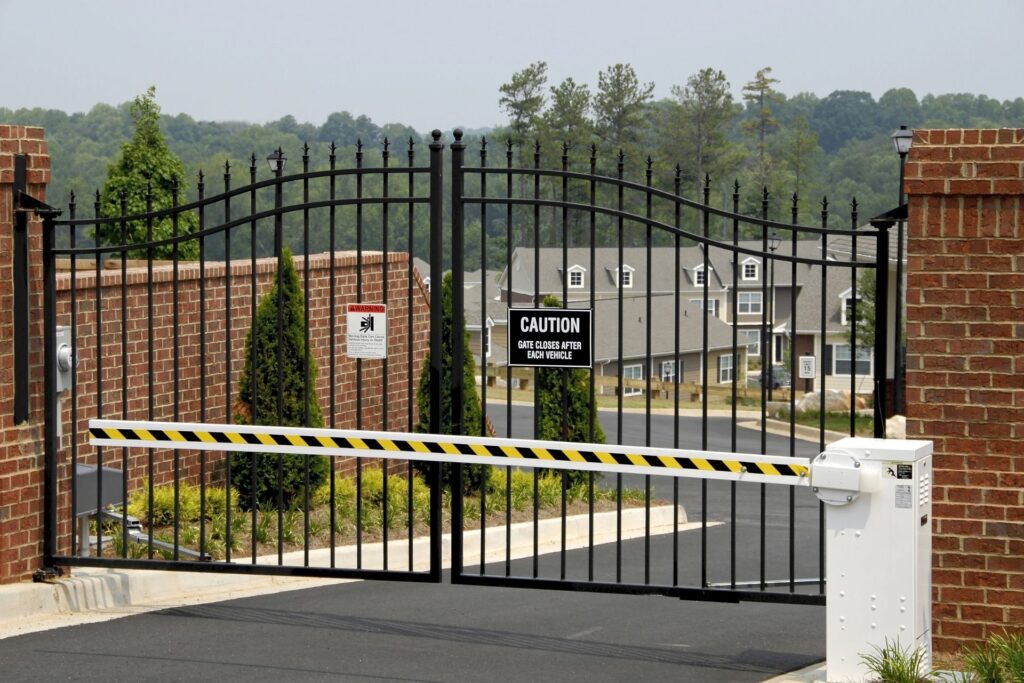
Popular Materials For Driveway Gates In NZ
Choosing the right material for your driveway gate is crucial to ensuring both aesthetic appeal and functionality. With NZ’s diverse climate and architectural styles, it’s essential to consider the advantages and maintenance requirements of each material.
Wooden Driveway Gates
Wooden driveway gates offer a timeless charm that fits seamlessly with both traditional and contemporary home designs. In New Zealand, where natural beauty plays a significant role in home aesthetics, wood is a popular choice. The durability of wood depends on the type of timber used, with options like cedar and pine being favored for their resilience. However, wooden gates require regular maintenance to protect against moisture, rot, and warping due to the often damp and changing NZ climate. Periodic staining or painting will help prolong the life of wooden gates while maintaining their natural allure.
Metal Driveway Gates (Steel, Aluminum, Wrought Iron)
Metal gates, including steel, aluminum, and wrought iron, are known for their durability and strength. Steel is a robust option that offers excellent security, though it may be prone to rust if not properly treated. Aluminum, on the other hand, is lighter and naturally resistant to corrosion, making it suitable for coastal areas in NZ. Wrought iron adds a touch of elegance with its intricate designs and classic appeal. Metal gates generally require less maintenance than wood, but regular inspections and occasional touch-ups are recommended to prevent corrosion, especially in harsh weather conditions.
Composite or PVC Gates
Composite and PVC gates have become increasingly popular in New Zealand due to their low-maintenance and weather-resistant properties. These gates mimic the look of wood but require far less upkeep, making them a practical choice for busy homeowners. They are also highly resistant to moisture and UV damage, making them well-suited to NZ’s varying climates, from humid coastal areas to colder inland regions.
Which Material is Best for You?
When deciding on the best material for your driveway gate, consider your budget, the style of your home, and the level of maintenance you’re willing to commit to. Wooden gates offer warmth and character but require upkeep, while metal gates provide strength and security with less maintenance. Composite or PVC gates strike a balance between aesthetics and practicality, offering the appearance of wood with minimal maintenance. Ultimately, your choice should align with your home’s style, your lifestyle, and the environmental demands of your region in New Zealand.
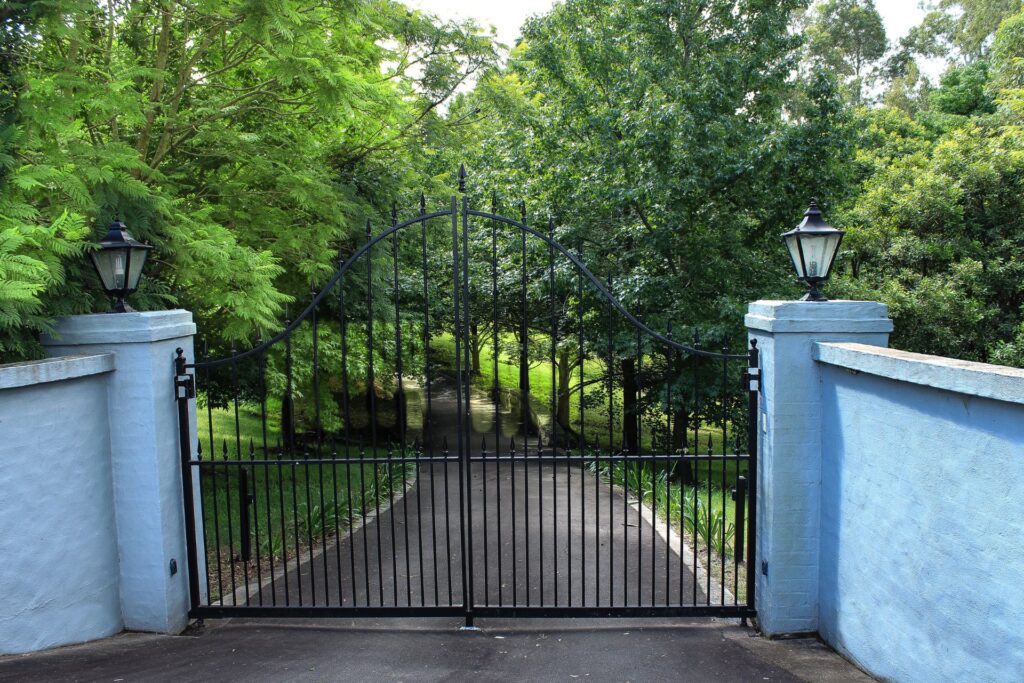
Choosing The Right Driveway Gate For Your NZ Home
When choosing the perfect driveway gate for your NZ home, it’s essential to consider various factors to ensure it enhances your property’s appeal while offering security.
- Consider Your Home’s Architecture: Start by evaluating your home’s architectural style. A modern home may suit sleek, minimalistic gates with clean lines and neutral tones, like steel or aluminium. On the other hand, a traditional villa may be better complemented by an ornate, wrought-iron gate that adds a touch of timeless elegance. For rustic homes or rural properties, timber gates can add warmth and a natural feel, seamlessly blending with the surrounding environment. Your driveway gate should enhance your home’s aesthetic, acting as an extension of your design vision rather than a standalone feature.
- Assessing Your Driveway’s Layout: Next, assess the layout of your driveway. If you have a flat, wide driveway, a swing gate could be an ideal option, offering a grand and functional entrance. However, if your driveway is sloped or has limited space, a sliding gate may be a more practical choice. Considerations like the width and orientation of your driveway will help you narrow down the options, ensuring the gate you choose functions smoothly without any hindrance.
- Balancing Security and Aesthetics: While curb appeal is important, don’t forget the primary function of a driveway gate—security. Look for a gate that strikes the right balance between providing a robust barrier to protect your home and enhancing its visual appeal. Materials like steel and iron are excellent for security while still offering customization options that make the gate aesthetically pleasing.
- Budget Considerations: Finally, set a realistic budget for your driveway gate. Prioritize essential features like durability and security, and then look at aesthetic enhancements within your price range. It’s important to balance the initial investment with long-term maintenance costs, ensuring your gate remains a valuable addition to your home for years to come.
This thoughtful approach ensures that your driveway gate complements your NZ home’s character, layout, and security needs while staying within budget.
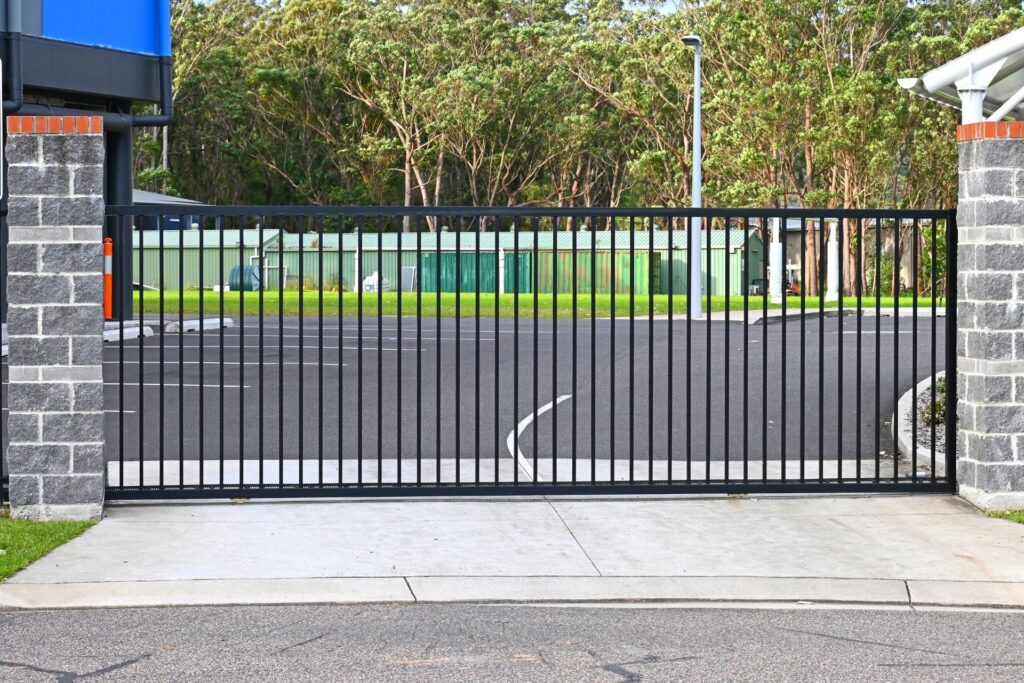
Driveway Gate Installation In NZ: What To Expect
When planning to install a driveway gate in New Zealand, homeowners must decide whether to tackle the project themselves or hire a professional. DIY vs. Professional Installation is a major consideration. While DIY installation can be cost-effective and satisfying, it comes with challenges, such as ensuring precise measurements, handling heavy materials, and dealing with electrical components for automatic gates. Many choose professional installation because it guarantees expertise, faster completion, and reduced risk of mistakes that could be costly to fix later. Professionals can also provide warranties, giving you peace of mind that the job will be done right.
Another important aspect is Permits and Regulations. Depending on where you live in NZ, local councils may require permits for driveway gate installations, especially for automatic gates or those that impact traffic flow or public access. It’s essential to check with your local council to understand any restrictions or compliance requirements, including height restrictions and boundary setbacks.
The Installation Timeline typically varies depending on the complexity of the gate. For a basic manual gate, the process can be completed in a few days, including design, preparation, and installation. However, automatic gates may take longer due to the need for electrical work and additional features like intercom systems. Homeowners should expect the project to span anywhere from a week to several weeks.
There are also several Potential Challenges to be aware of. If your driveway is sloped, installation may require custom designs or modifications to ensure the gate operates smoothly. For automatic gates, securing a reliable power source is crucial, and solar-powered options may be considered in areas with limited access to electricity. Additionally, ongoing maintenance, such as lubricating moving parts and keeping sensors clean, should be factored into your long-term plans.
By understanding these key aspects, homeowners can better prepare for a smooth and successful driveway gate installation in New Zealand.
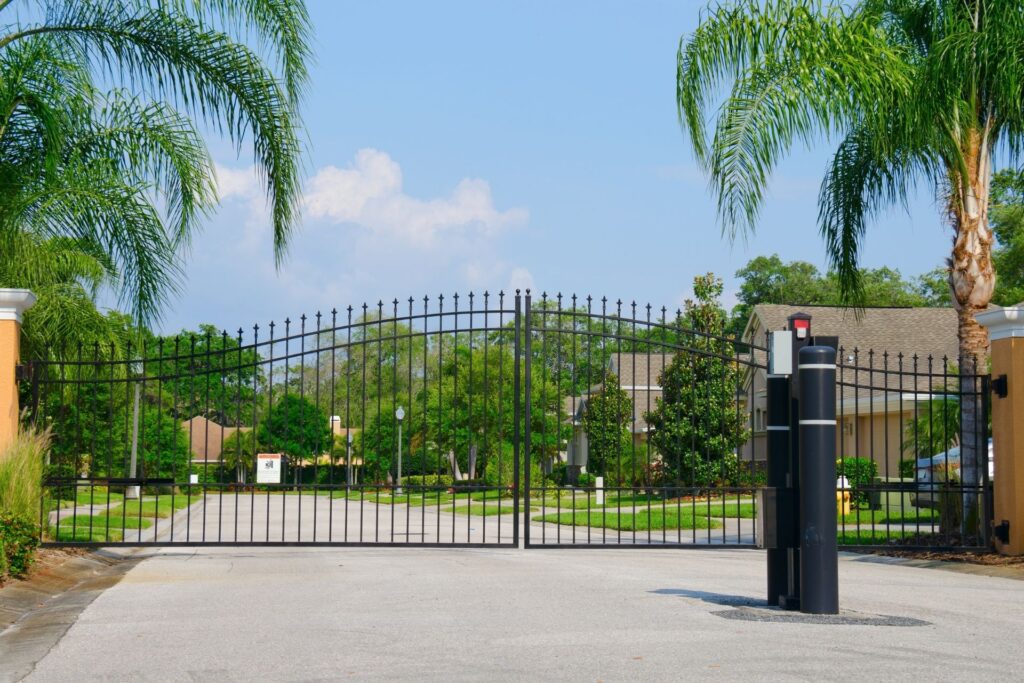
Costs Of Driveway Gates In NZ
When considering driveway gates in New Zealand, understanding the cost differences across various gate types is essential. The price ranges can vary significantly depending on the style, materials, and level of automation you choose.
Average Price Ranges for Different Gate Types
In New Zealand, the average price for a driveway gate can start around $1,500 and climb up to $8,000 or more. For instance, a basic manual swing gate typically ranges from $1,500 to $3,500, while sliding gates generally fall between $3,000 and $6,000. If you’re looking for automatic gates, expect the cost to increase. Automatic swing gates can range from $4,000 to $7,000, while sliding automatic gates might range from $5,000 to $8,000 depending on the complexity and additional features.
Factors Influencing Costs
Several factors contribute to the overall cost of driveway gates. Material plays a significant role—gates made from steel or hardwood are typically more expensive than those made from aluminum or softwoods. The size of the gate also impacts the price, as larger gates require more material and labor. Automation further increases the cost, particularly if advanced technology like remote control or smartphone integration is added. Customization is another factor—if you opt for intricate designs, unique finishes, or special features, these can drive up costs considerably.
Long-Term Costs
It’s important to also consider the long-term expenses associated with your driveway gate. Maintenance costs for wooden gates can be higher due to weatherproofing and regular upkeep, while repair costs for automated systems might add up if parts like motors or sensors need replacement. Additionally, if you have an automated gate, there could be costs involved in upgrading the technology over time to stay current with advances in automation.
Cost-Saving Tips
To save on driveway gate installation without sacrificing quality, consider choosing materials that strike a balance between durability and affordability, like powder-coated aluminum. Opt for manual gates if you don’t need automation immediately, as they can be upgraded later. It also helps to shop around for quotes from multiple installers and look for local suppliers to minimize transportation costs.
By keeping these factors in mind, you can make an informed decision that balances upfront investment with long-term value.
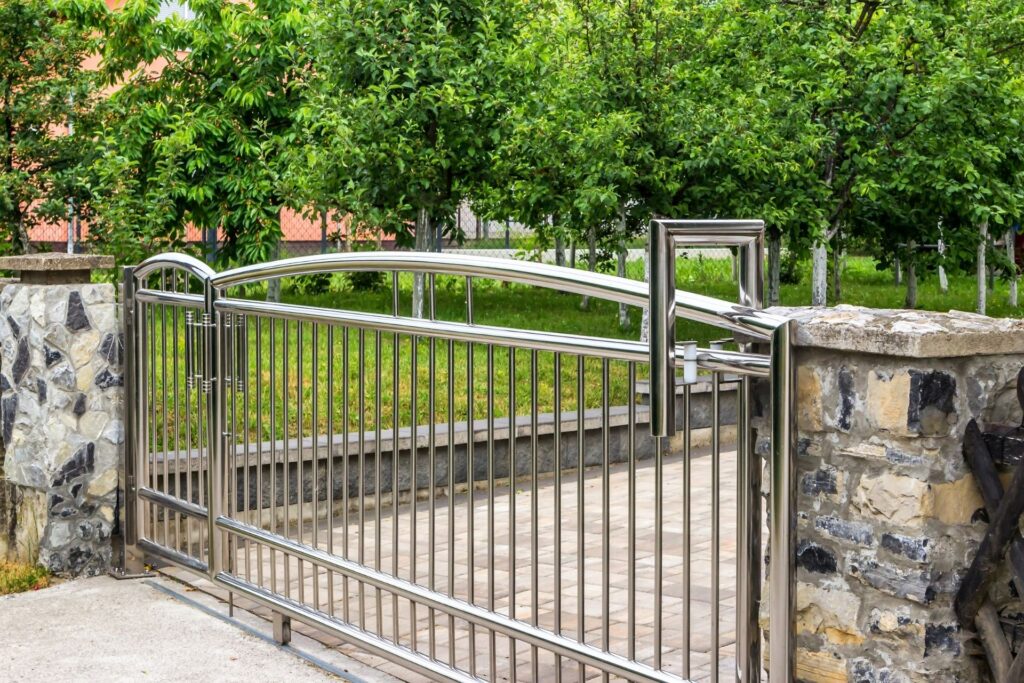
Maintaining Your Driveway Gate In NZ’s Climate
Maintaining your driveway gate is essential to ensure its longevity, especially given New Zealand’s diverse climate. Routine upkeep not only preserves the gate’s functionality but also enhances its appearance and value over time. Here are some practical tips to keep your gate in top condition.
Routine Maintenance Tips
To maintain your gate, regular cleaning is crucial. For metal gates, use a mild detergent to wash off dirt, grime, and any salty residue that might accumulate, especially in coastal areas. This helps prevent rust and corrosion. For wooden gates, ensure they are treated with weather-resistant sealants or stains to protect against moisture damage and fading from UV exposure. Lubricating hinges and moving parts every six months will also reduce wear and tear, ensuring smooth operation.
Weather-Related Concerns
New Zealand’s varied weather conditions—ranging from heavy rain and humidity to coastal salt air—can significantly impact your gate. Metal gates are particularly vulnerable to rust in humid or coastal environments, while wooden gates may warp or rot if exposed to moisture without proper treatment. To mitigate these effects, consider using galvanized steel for metal gates, as it offers superior rust resistance. For wooden gates, ensure regular application of sealants to prevent water penetration. If your area experiences high winds, reinforcing your gate’s structure is advisable to avoid damage.
When to Call a Professional
While regular maintenance can prevent many issues, there are times when professional assistance is necessary. If you notice significant rust, warping, or mechanical issues that hinder the gate’s functionality, it’s best to call in a professional. They can assess the damage, offer repair solutions, and even recommend upgrades to improve durability in New Zealand’s challenging climate.
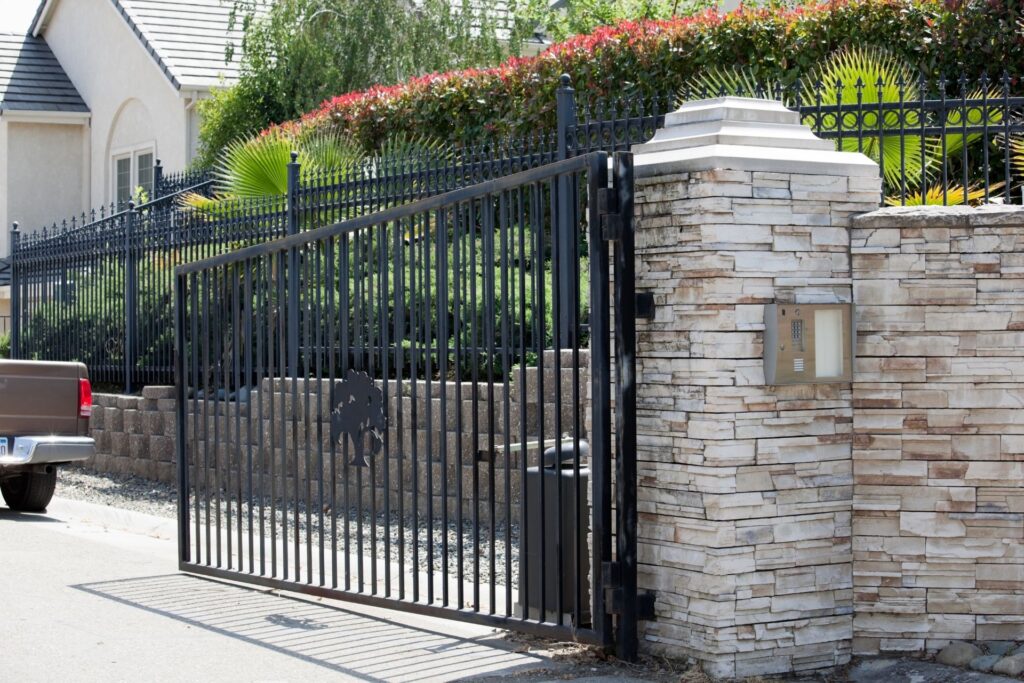
Driveway Gate Trends In New Zealand
In recent years, New Zealand homeowners have increasingly gravitated towards modern, stylish, and functional driveway gates that blend seamlessly with the aesthetic and technological demands of contemporary living.
- Modern Automation: A significant trend is the adoption of smart gate technologies. Homeowners now have the convenience of operating their gates via smartphones, providing remote access and real-time monitoring. Intercom systems integrated with these gates allow for communication with visitors from anywhere, while solar-powered options are gaining popularity for their energy efficiency and environmental benefits. Automation isn’t just a luxury anymore; it’s a practical solution that enhances both security and convenience.
- Sustainability: Eco-conscious consumers are driving a shift towards sustainable materials and environmentally friendly manufacturing processes. Gates made from recycled or sustainably sourced materials are becoming a preferred choice for those looking to reduce their carbon footprint. Manufacturers are responding by innovating in areas such as low-impact coatings, recycled metals, and responsibly harvested timber, aligning with the growing awareness around sustainability.
- Minimalist Designs: The minimalist trend is dominating driveway gate design, with clean lines, sleek profiles, and functional simplicity taking precedence. These designs often emphasize high-quality materials that speak for themselves without excessive ornamentation. Homeowners are looking for gates that are visually unobtrusive yet stylish, harmonizing with modern architectural aesthetics.
- Security-First Gates: As safety becomes an increasing priority, more homeowners are integrating their driveway gates with comprehensive home security systems. Gates now often feature advanced locking mechanisms, security cameras, and motion detectors, ensuring that security begins at the property’s entry point. This focus on security underscores a wider trend where functionality and peace of mind are paramount considerations for New Zealand homeowners.
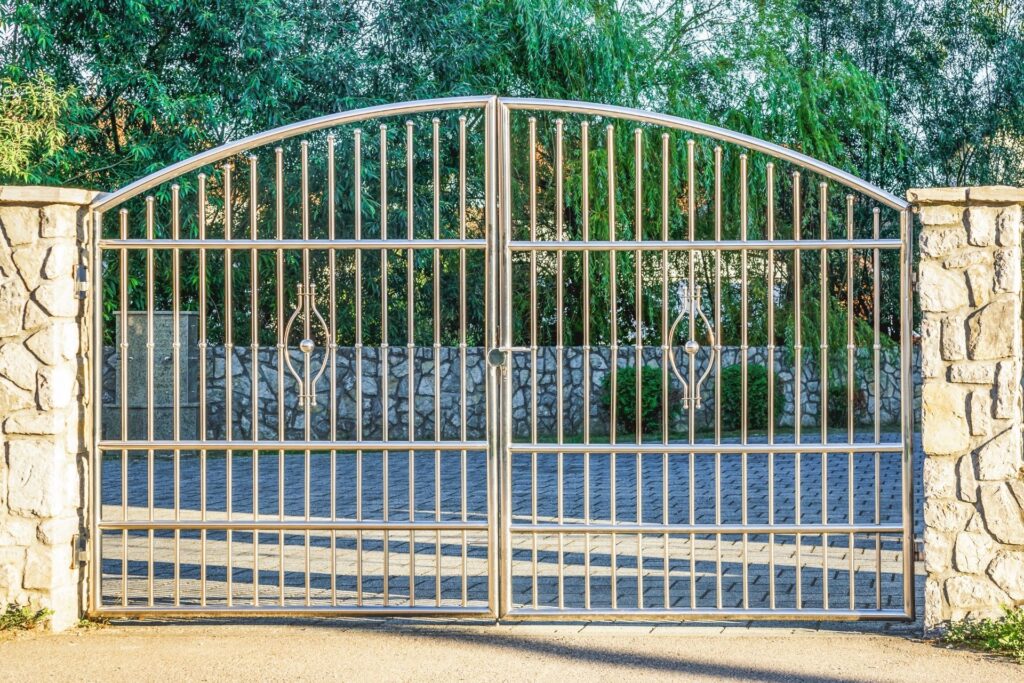
How To Choose A Driveway Gate Provider In NZ
Choosing the right driveway gate provider in New Zealand requires careful consideration to ensure quality, durability, and long-term satisfaction. Start by looking for companies with a proven track record in the industry. Experience matters, as it often reflects a company’s ability to deliver reliable products and services. Also, evaluate the quality of their gates—whether you’re looking for wooden, metal, or custom designs, the materials should be sourced sustainably and built to withstand NZ’s unique climate. Customer service is another critical factor; a company that offers clear communication and efficient after-sales support can make the entire process smoother. Always check reviews and testimonials to gauge how past customers rate their experience, focusing on feedback about product longevity and installation services.
Before committing, ask the provider key questions. What warranty do they offer? Do they provide installation support, or will you need to hire a separate contractor? Additionally, inquire about material sourcing—are they using local materials or importing them? These details can significantly impact the gate’s quality and your overall costs.
For trusted providers, consider companies like Fencing New Zealand, Gate Makers, and Boundary line. These businesses are well-known for delivering high-quality gates and offer a range of design options to suit both residential and commercial properties. When making your decision, a combination of research, clear communication, and choosing a reputable provider will ensure that your new driveway gate meets your expectations and lasts for years to come.
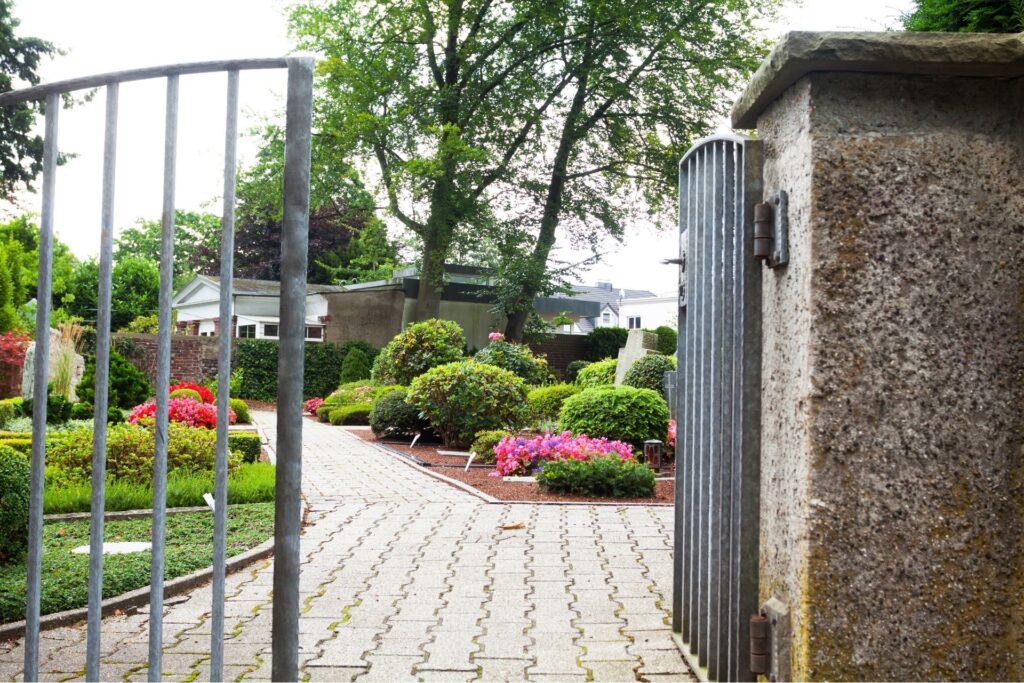
FAQs: About Driveway Gates NZ
What are the main types of driveway gates available in NZ?
The main types of driveway gates available in NZ are swing gates, sliding gates, and automatic gates. Swing gates open inward or outward like a door, while sliding gates move horizontally along a track. Automatic gates can be either swing or sliding but are motorized for convenience.
How much does it cost to install a driveway gate in NZ?
The cost of installing a driveway gate in NZ typically ranges from $1,500 to $10,000, depending on factors such as the type of gate, the material used, whether it’s manual or automatic, and any customizations. Additional costs may include professional installation and ongoing maintenance.
What materials are commonly used for driveway gates in NZ?
Common materials for driveway gates in NZ include wood, metal (such as steel, aluminum, and wrought iron), and composite materials like PVC. Each material offers different benefits in terms of durability, aesthetics, and maintenance needs.
Are automatic driveway gates worth the investment?
Automatic driveway gates are worth the investment for those who prioritize convenience, security, and modern technology. While they are more expensive upfront than manual gates, they offer added ease of use, especially with remote access or smart home integration.
Do I need a permit to install a driveway gate in NZ?
In some cases, you may need a permit to install a driveway gate in NZ, particularly if the gate affects public footpaths, roads, or access. It’s advisable to check with your local council to ensure compliance with any regulations before installation.
How do I maintain my driveway gate in New Zealand’s climate?
Maintaining your driveway gate in NZ involves routine cleaning, applying protective treatments to wooden gates, preventing rust on metal gates, and checking moving parts like hinges or tracks for wear. Regular maintenance helps prolong the gate’s life, especially in areas with heavy rain, humidity, or coastal conditions.
Which type of driveway gate is best for sloping driveways?
Sliding gates are typically the best option for sloping driveways, as they do not require the gate to swing open in a limited or uneven space. Swing gates can be problematic on slopes due to the angle of the ground affecting the swing path.
Can driveway gates be customized in New Zealand?
Yes, driveway gates can be customized in New Zealand to suit your personal preferences, property style, and specific dimensions. Many providers offer custom designs in a variety of materials, colors, and finishes, allowing you to create a unique gate that fits your needs.
What are the benefits of having a driveway gate?
Driveway gates provide several benefits, including enhanced security, increased privacy, improved curb appeal, and the potential to increase property value. Automatic gates add convenience by allowing remote access without leaving your vehicle.
How long does it take to install a driveway gate?
The installation timeline for a driveway gate can vary depending on the type of gate, the complexity of the design, and whether it is custom-made. Typically, it takes 1-3 days for the installation of a standard gate. However, custom gates or gates with automation features may take longer due to additional wiring, setting up motors, or building complexity.
Conclusion
In conclusion, selecting the right driveway gate is an important decision that can enhance both the security and aesthetic appeal of your home. Throughout this guide, we’ve explored the various gate styles, materials, and features that can suit different needs and budgets. It’s now time to take the next step—consider your options carefully and consult with a professional who can help you make the best choice for your property. Whether you’re seeking added privacy, increased security, or simply a stylish new feature for your driveway, the right gate can make a significant impact. To get started, reach out to local gate providers, explore design possibilities, or schedule a consultation today. By taking action, you’ll be one step closer to enhancing your home’s entrance with a gate that perfectly fits your style and functional needs.
About the Author:
Mike Veail is a recognized digital marketing expert with over 6 years of experience in helping tradespeople and small businesses thrive online. A former quantity surveyor, Mike combines deep industry knowledge with hands-on expertise in SEO and Google Ads. His marketing strategies are tailored to the specific needs of the trades sector, helping businesses increase visibility and generate more leads through proven, ethical methods.
Mike has successfully partnered with numerous companies, establishing a track record of delivering measurable results. His work has been featured across various platforms that showcase his expertise in lead generation and online marketing for the trades sector.
Learn more about Mike's experience and services at https://theleadguy.online or follow him on social media:

